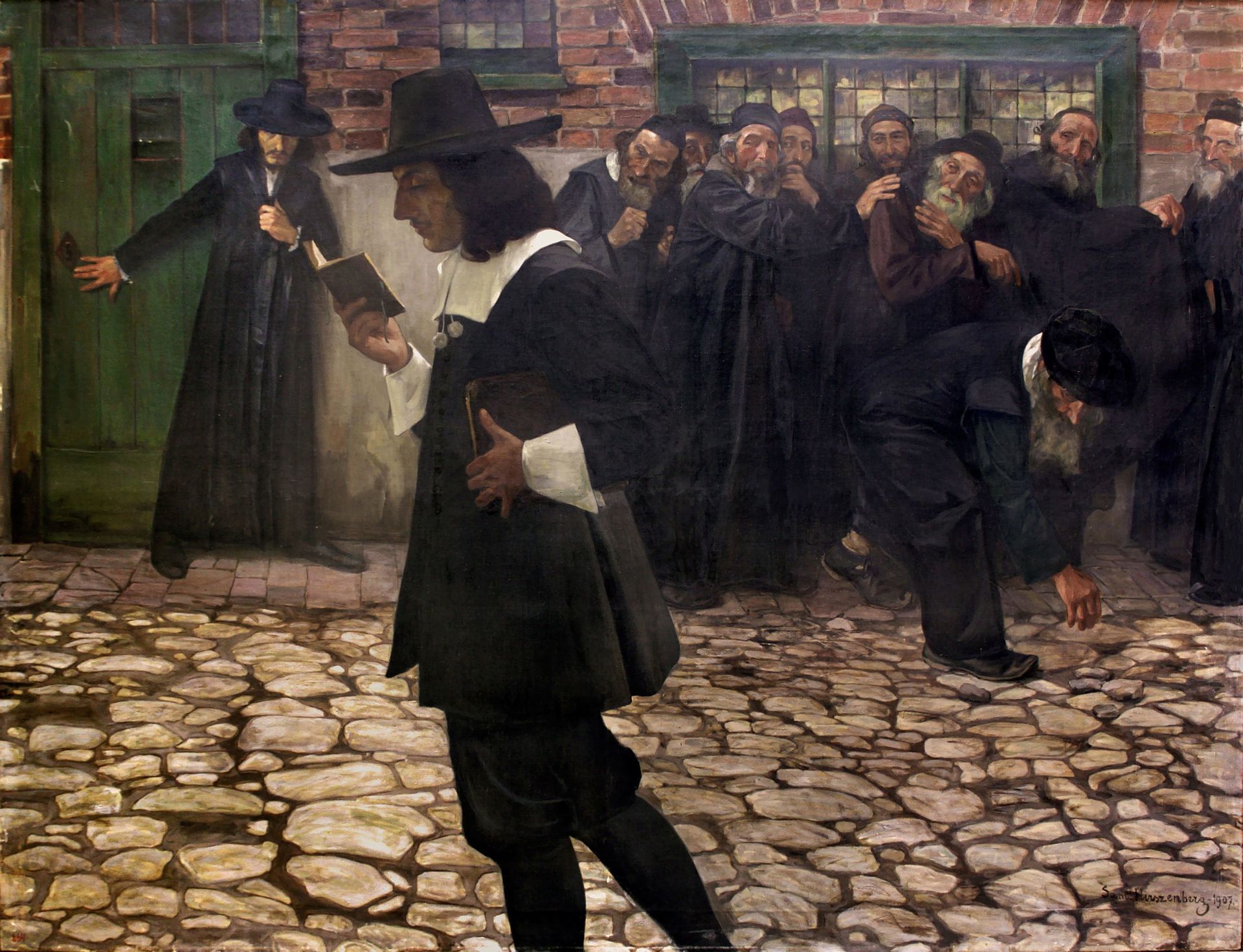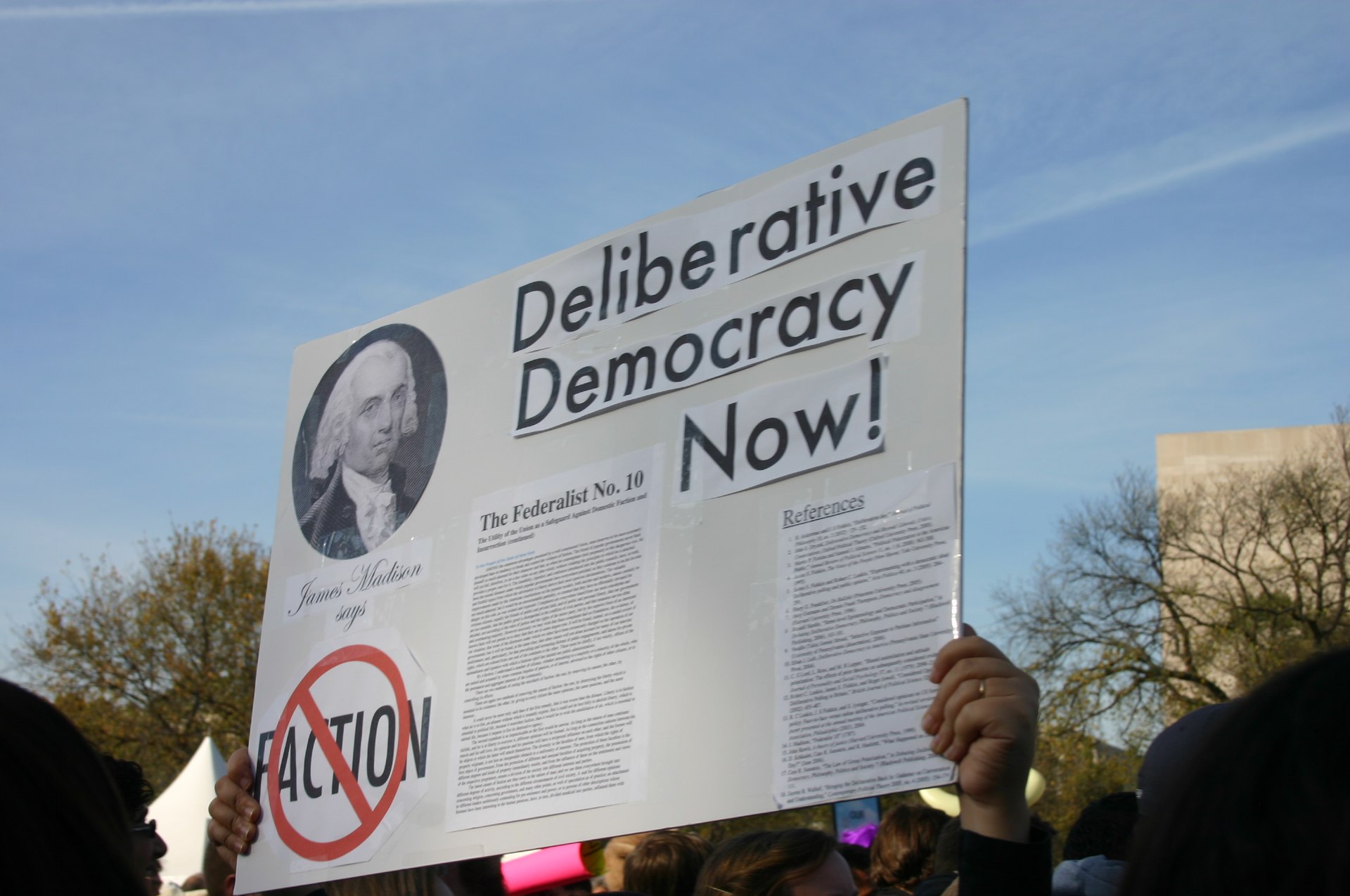熟議民主主義は万能か?
Is deliberative democracy a panacea?

Spinoza,
Excommunicated by Samuel
Hirszenberg, 1907
熟議民主主義は万能か?
Is deliberative democracy a panacea?

Spinoza,
Excommunicated by Samuel
Hirszenberg, 1907
★熟議民主主義の議論の前に、熟議(Deliberation)とは?
熟議とは、例えば投票前に選択肢を慎重に
検討する思考プロセスである。熟議は力関係や創造性、対話ではなく、論理と理性の活用を重視する。集団の決定は通常、熟議を経て投票や関係者の合意によっ
て下される。
法廷では陪審員が熟議を行うことで有名だ。陪審員には有罪か無罪かといった特定の選択肢と、評価のための情報・論拠が与えられるからだ。「熟議民主主義」
では、選出された公職者と一般市民の双方が、投票の根拠として権力闘争ではなく熟議を用いることを目指す。
個人の熟議とは、日常的な合理的な意思決定の過程を指す言葉でもある。その意味で、これは認識論的な美徳と言える。
★ 熟議民主主義は万能か? Is deliberative democracy a panacea?
熟議民主主義または討議民主主義は、熟議
が意思決定の中心となる民主主義の形態である。熟議民主主義では、意思決定者をより少数ではあるがより代表的な母集団に限定し、その集団に一つの問題に集
中する時間とリソースを与えることで、量より質を重視する。[1]
また、合意に基づく意思決定と多数決の両方の要素を取り入れることが多い。熟議民主主義は、単なる投票ではなく、本物の熟議が法の正当性の主な源泉である
という点で、従来の民主主義理論とは異なる。熟議民主主義は、市民との協議が民主主義のプロセスにおいて中心的な役割を果たす協議型民主主義と関連してい
る。熟議民主主義と代表制民主主義や直接民主主義などの概念との距離については議論がある。一部の専門家や理論家は、熟議民主主義を、議員が立法を提案し
制定する選挙で選ばれた機関を指して用いるが、ヘレン・ランドモア(Hélène
Landemore)をはじめとする一部の専門家は、熟議民主主義を、無作為に選ばれた一般市民が同等の権限を持つ意思決定を指して用いることが多くなっ
ている。
熟議民主主義は古代まで遡る長い歴史を持つ実践と理論があり、1990年代に学術的な注目が高まり、2010年以降は実施例も増えている。ジョセフ・M・
ベセットは、1980年の著書『熟議民主主義:共和制政府における多数派原理』でこの用語を初めて使用した人物として知られている。[3]
| Deliberative
democracy or discursive democracy is a form of democracy in which
deliberation is central to decision-making. Deliberative democracy
seeks quality over quantity by limiting decision-makers to a smaller
but more representative sample of the population that is given the time
and resources to focus on one issue.[1] It often adopts elements of both consensus decision-making and majority rule. Deliberative democracy differs from traditional democratic theory in that authentic deliberation, not mere voting, is the primary source of legitimacy for the law. Deliberative democracy is related to consultative democracy, in which public consultation with citizens is central to democratic processes. The distance between deliberative democracy and concepts like representative democracy or direct democracy is debated. While some practitioners and theorists use deliberative democracy to describe elected bodies whose members propose and enact legislation, Hélène Landemore and others increasingly use deliberative democracy to refer to decision-making by randomly-selected lay citizens with equal power.[2] Deliberative democracy has a long history of practice and theory traced back to ancient times, with an increase in academic attention in the 1990s, and growing implementations since 2010. Joseph M. Bessette has been credited with coining the term in his 1980 work Deliberative Democracy: The Majority Principle in Republican Government.[3] |
熟議民主主義または討議民主主義は、熟議が意思決定の中心となる民主主
義の形態である。熟議民主主義では、意思決定者をより少数ではあるがより代表的な母集団に限定し、その集団に一つの問題に集中する時間とリソースを与える
ことで、量より質を重視する。[1] また、合意に基づく意思決定と多数決の両方の要素を取り入れることが多い。熟議民主主義は、単なる投票ではなく、本物の熟議が法の正当性の主な源泉である という点で、従来の民主主義理論とは異なる。熟議民主主義は、市民との協議が民主主義のプロセスにおいて中心的な役割を果たす協議型民主主義と関連してい る。熟議民主主義と代表制民主主義や直接民主主義などの概念との距離については議論がある。一部の専門家や理論家は、熟議民主主義を、議員が立法を提案し 制定する選挙で選ばれた機関を指して用いるが、ヘレン・ランドモア(Hélène Landemore)をはじめとする一部の専門家は、熟議民主主義を、無作為に選ばれた一般市民が同等の権限を持つ意思決定を指して用いることが多くなっ ている。 熟議民主主義は古代まで遡る長い歴史を持つ実践と理論があり、1990年代に学術的な注目が高まり、2010年以降は実施例も増えている。ジョセフ・M・ ベセットは、1980年の著書『熟議民主主義:共和制政府における多数派原理』でこの用語を初めて使用した人物として知られている。[3] |
| Overview Deliberative democracy holds that, for a democratic decision to be legitimate, it must be preceded by authentic deliberation, not merely the aggregation of preferences that occurs in voting. Authentic deliberation is deliberation among decision-makers that is free from distortions of unequal political power, such as power a decision-maker obtains through economic wealth or the support of interest groups.[4][5][6] The roots of deliberative democracy can be traced back to Aristotle and his notion of politics; however, the German philosopher Jürgen Habermas' work on communicative rationality and the public sphere is often identified as a major work in this area.[7] Deliberative democracy can be practiced by decision-makers in both representative democracies and direct democracies.[8] In elitist deliberative democracy, principles of deliberative democracy apply to elite societal decision-making bodies, such as legislatures and courts; in populist deliberative democracy, principles of deliberative democracy apply to groups of lay citizens who are empowered to make decisions.[5] One purpose of populist deliberative democracy can be to use deliberation among a group of lay citizens to distill a more authentic public opinion about societal issues for other decision-makers to consider; devices such as the deliberative opinion poll have been designed to achieve this goal. Another purpose of populist deliberative democracy can, like direct democracy, result directly in binding law.[5][9] If political decisions are made by deliberation but not by the people themselves or their elected representatives, then there is no democratic element; this deliberative process is called elite deliberation.[10][11] James Fearon and Portia Pedro believe deliberative processes most often generate ideal conditions of impartiality, rationality and knowledge of the relevant facts, resulting in more morally correct outcomes.[12][13][14] Former diplomat Carne Ross contends that the processes more civil, collaborative, and evidence-based than the debates in traditional town hall meetings or in internet forums if citizens know their debates will impact society.[15] Some fear the influence of a skilled orator.[16][17] John Burnheim critiques representative democracy as requiring citizens to vote for a large package of policies and preferences bundled together, much of which a voter might not want. He argues that this does not translate voter preferences as well as deliberative groups, each of which are given the time and the ability to focus on one issue.[18] |
概要 熟議民主主義では、民主的な意思決定が正当であるためには、投票における単なる好みの集計ではなく、真正な熟議が先行されなければならないと主張する。真 正な熟議とは、意思決定者間の熟議であり、意思決定者が経済的な富や利益団体の支援を通じて得るような不平等な政治力による歪曲から自由なものである。 [4][5][6] 熟議民主主義の起源は、アリストテレスの政治観にまで遡ることができるが、この分野における主要な著作としては、ドイツの哲学者ユルゲン・ハーバーマスの コミュニケーション的理性と公共圏に関する著作が挙げられることが多い。 熟議民主主義は、代議制民主主義と直接民主主義の両方の意思決定者によって実践することができる。[8] エリート主義的な熟議民主主義では、熟議民主主義の原則は、立法府や司法府といったエリート社会の意思決定機関に適用される。大衆主義的な熟議民主主義で は、熟議民主主義の原則は、 決定権を持つ一般市民のグループに適用される。[5] ポピュリスト的討議民主主義の目的の一つは、一般市民のグループによる討議を通じて、社会問題に関するより本物の世論を抽出して他の意思決定者が考慮でき るようにすることである。また、ポピュリスト的討議民主主義のもう一つの目的は、直接民主主義と同様に、拘束力のある法律を直接的に生み出すことである。 [5][9] もし政治的意思決定が、国民やその選出された代表者ではなく、討議によってなされるのであれば、そこには民主主義的な要素は存在しない。この討議プロセス はエリート討議と呼ばれる。[10][11] ジェームズ・フィアロンとポルティア・ペドロは、熟議プロセスは公平性、合理性、関連事実の知識という理想的な条件を生み出すことが最も多く、その結果、 より道徳的に正しい結果がもたらされると考えている。[12][13][14] 元外交官のカーン・ロスは、市民が議論が社会に影響を与えることを知っている場合、このプロセスは従来のタウンホールミーティングやインターネットフォー ラムでの議論よりも、より礼儀正しく、協力的で、証拠に基づいたものになると主張している。。市民が議論が社会に影響を与えることを理解していれば、従来 のタウンホールミーティングやインターネットフォーラムでの討論よりも、より礼儀正しく、協調的で、証拠に基づくプロセスになるだろうと主張している。 [15] 熟練した演説家の影響力を懸念する声もある。[16][17] ジョン・バーンハイムは、代表制民主主義では、有権者は望んでいないかもしれない政策や希望の多くがひとまとめにされた大きなパッケージに対して投票しな ければならないと批判している。彼は、熟議グループでは、それぞれに時間を割き、一つの問題に集中する能力が与えられるため、これは有権者の好みを反映す るものではないと主張している。[18] |
| Characteristics Fishkin's model of deliberation James Fishkin, who has designed practical implementations of deliberative democracy through deliberative polling for over 15 years in various countries,[15] describes five characteristics essential for legitimate deliberation: Information: The extent to which participants are given access to reasonably accurate information that they believe to be relevant to the issue Substantive balance: The extent to which arguments offered by one side or from one perspective are answered by considerations offered by those who hold other perspectives Diversity: The extent to which the major positions in the public are represented by participants in the discussion Conscientiousness: The extent to which participants sincerely weigh the merits of the arguments Equal consideration: The extent to which arguments offered by all participants are considered on the merits regardless of which participants offer them[19] Studies by James Fishkin and others have concluded that deliberative democracy tends to produce outcomes which are superior to those in other forms of democracy.[20][21] Desirable outcomes in their research include less partisanship and more sympathy with opposing views; more respect for evidence-based reasoning rather than opinion; a greater commitment to the decisions taken by those involved; and a greater chance for widely shared consensus to emerge, thus promoting social cohesion between people from different backgrounds.[10][15] Fishkin cites extensive empirical support for the increase in public spiritedness that is often caused by participation in deliberation, and says theoretical support can be traced back to foundational democratic thinkers such as John Stuart Mill and Alexis de Tocqueville.[22][23] Cohen's outline Joshua Cohen, a student of John Rawls, argued that the five main features of deliberative democracy include:[24] An ongoing independent association with expected continuation. The citizens in the democracy structure their institutions such that deliberation is the deciding factor in the creation of the institutions and the institutions allow deliberation to continue. A commitment to the respect of a pluralism of values and aims within the polity. The citizens consider deliberative procedure as the source of legitimacy, and prefer the causal history of legitimation for each law to be transparent and easily traceable to the deliberative process. Each member recognizes and respects other members' deliberative capacity. Cohen presents deliberative democracy as more than a theory of legitimacy, and forms a body of substantive rights around it based on achieving "ideal deliberation":[24] It is free in two ways: The participants consider themselves bound solely by the results and preconditions of the deliberation. They are free from any authority of prior norms or requirements. The participants suppose that they can act on the decision made; the deliberative process is a sufficient reason to comply with the decision reached. Parties to deliberation are required to state reasons for their proposals, and proposals are accepted or rejected based on the reasons given, as the content of the very deliberation taking place. Participants are equal in two ways: Formal: anyone can put forth proposals, criticize, and support measures. There is no substantive hierarchy. Substantive: The participants are not limited or bound by certain distributions of power, resources, or pre-existing norms. "The participants…do not regard themselves as bound by the existing system of rights, except insofar as that system establishes the framework of free deliberation among equals." Deliberation aims at a rationally motivated consensus: it aims to find reasons acceptable to all who are committed to such a system of decision-making. When consensus or something near enough is not possible, majoritarian decision making is used. In Democracy and Liberty, an essay published in 1998, Cohen updated his idea of pluralism to "reasonable pluralism" – the acceptance of different, incompatible worldviews and the importance of good faith deliberative efforts to ensure that as far as possible the holders of these views can live together on terms acceptable to all.[25] Gutmann and Thompson's model Amy Gutmann and Dennis F. Thompson's definition captures the elements that are found in most conceptions of deliberative democracy. They define it as "a form of government in which free and equal citizens and their representatives justify decisions in a process in which they give one another reasons that are mutually acceptable and generally accessible, with the aim of reaching decisions that are binding on all at present but open to challenge in the future".[26] They state that deliberative democracy has four requirements, which refer to the kind of reasons that citizens and their representatives are expected to give to one another: Reciprocal. The reasons should be acceptable to free and equal persons seeking fair terms of cooperation. Accessible. The reasons must be given in public and the content must be understandable to the relevant audience. Binding. The reason-giving process leads to a decision or law that is enforced for some period of time. The participants do not deliberate just for the sake of deliberation or for individual enlightenment. Dynamic or Provisional. The participants must keep open the possibility of changing their minds, and continuing a reason-giving dialogue that can challenge previous decisions and laws. Standards of good deliberation - from first to second generation (Bächtiger et al., 2018) For Bächtiger, Dryzek, Mansbridge and Warren, the ideal standards of "good deliberation" which deliberative democracy should strive towards have changed:[6] |
特徴 フィッシュキンの熟議モデル ジェームズ・フィッシュキンは、15年以上にわたり、さまざまな国々で熟議投票を通じて熟議民主主義の実用的な実施方法を考案してきた人物であるが、 [15] 正当な熟議に不可欠な5つの特徴を次のように説明している。 情報:参加者が、その問題に関連していると考える妥当な正確性を持つ情報にアクセスできる程度 実質的バランス:一方の側または一方の見解から提示された議論が、他の見解を持つ人々によって提示された考察によってどの程度回答されているか 多様性:議論の参加者が、一般市民の主要な立場をどの程度代表しているか 誠実さ:参加者が議論の長所をどの程度真剣に検討しているか 平等な考察:すべての参加者が提示した議論が、どの参加者が提示したかに関わらず、その長所に基づいてどの程度検討されているか[19] ジェームズ・フィシュキン(James Fishkin)氏らの研究では、熟議民主主義は他の民主主義の形態よりも優れた成果を生み出す傾向があると結論づけている。[20][21] 彼らの研究で望ましい成果として挙げられているのは、党派性が弱まり、反対意見への共感が強まること、意見よりも証拠に基づく推論が尊重されること、関係 者による決定へのコミットメントが高まること、 異なる背景を持つ人々の間の社会的結束を促進する、広く共有された合意が生まれる可能性が高まる。[10][15] フィッシュキンは、熟議への参加によってしばしば引き起こされる公共精神の高まりについて、広範な実証的裏付けを挙げ、理論的裏付けはジョン・スチュアー ト・ミルやアレクシス・ド・トクヴィルといった民主主義の基礎を築いた思想家にまで遡ることができると述べている。[22][23] コーエンの概要 ジョン・ロールズの弟子であるジョシュア・コーエンは、熟議民主主義の主な特徴として以下の5つを挙げている。[24] 継続が期待される独立した組織。 民主主義の市民は、熟議が組織の創設における決定要因であり、組織が熟議の継続を可能にするような組織構造を構築する。 政治体制内の価値観と目標の多元主義を尊重することへのコミットメント。 市民は熟議手続きを正当性の源とみなしており、各法の正当化の経緯は透明性があり、熟議プロセスに容易に遡及できることを好む。 各メンバーは他のメンバーの熟議能力を認識し、尊重する。 コーエンは熟議民主主義を正当性の理論以上のものとして提示しており、「理想的な熟議」の達成を基盤として、実質的な権利体系を形成している。[24] それは2つの点で自由である。 参加者は、自分たちが審議の結果と前提条件のみに拘束されると考える。彼らは、過去の規範や要件の権威から自由である。 参加者は、自分たちが下した決定に従って行動できると想定する。審議プロセスは、下された決定に従うための十分な理由である。 審議の当事者は、提案の理由を述べることが求められ、提案は、審議が行われているまさにその審議の内容として、示された理由に基づいて承認または却下され る。 参加者は次の2つの点で平等である。 形式的:誰もが提案を行い、批判し、措置を支持することができる。実質的な上下関係はない。 実質的:参加者は、特定の権力、資源、または既存の規範の配分によって制限されたり拘束されたりすることはない。「参加者は…平等な者同士の自由な審議の 枠組みを確立する限りにおいて、既存の権利体系に拘束されるとはみなさない」 熟慮の目的は、合理的に導かれた合意である。すなわち、そのような意思決定システムにコミットするすべての人々が受け入れられる理由を見出すことを目的と している。合意またはそれに近いものが不可能な場合は、多数決による意思決定が用いられる。 1998年に発表された論文『民主主義と自由』の中で、コーエンは多元主義の考え方を「合理的な多元主義」へと発展させた。それは、異なる相容れない世界 観を認め、それらの世界観の保有者が可能な限りすべての人々に受け入れられる条件のもとで共存できるようにするための誠実な熟議努力の重要性を意味する。 ガットマンとトンプソンのモデル エイミー・ガットマンとデニス・F・トンプソンの定義は、熟議民主主義のほとんどの概念に見られる要素を捉えている。彼らは熟議民主主義を「自由で平等な 市民とその代表者が、お互いに受け入れ可能で、一般的にアクセス可能な理由を提示し合うプロセスにおいて、決定を正当化する政府形態である。その目的は、 現在では全員を拘束する決定を導き出すことだが、将来的には異議を申し立てることも可能にする」と定義している。[26] 彼らは、熟議民主主義には4つの要件があり、それは市民と代表者が互いに示すことが期待される理由の種類を指していると述べている。 相互的であること。その理由は、公平な協力条件を求める自由で対等な人々にとって受け入れられるものでなければならない。 アクセス可能であること。その理由は公の場で提示され、その内容は関連する聴衆にとって理解できるものでなければならない。 拘束力があること。理由提示のプロセスは、一定期間施行される決定や法律につながる。参加者は審議そのものや個人の啓発を目的として審議に参加しているわ けではない。 動的または暫定的。参加者は、考えを変える可能性を常に開いておかなければならず、以前の決定や法律に異議を唱えることができる理由説明の対話を継続しな ければならない。 熟議の基準 - 第1世代から第2世代へ(Bächtiger et al., 2018 Bächtiger、Dryzek、Mansbridge、Warrenにとって、熟議民主主義が目指すべき「熟議」の理想的な基準は変化している。 |
Standards for "good deliberation" Standards of good deliberation - from first to second generation (Bächtiger et al., 2018) For Bächtiger, Dryzek, Mansbridge and Warren, the ideal standards of "good deliberation" which deliberative democracy should strive towards have changed:[6] |
「良質な熟議」の基準 熟議の基準 - 第一世代から第二世代へ(Bächtiger et al., 2018) Bächtiger、Dryzek、Mansbridge、Warrenにとって、熟議民主主義が目指すべき「熟議」の理想的な基準は変化した。[6] |
| History Early examples Main article: Sortition Consensus-based decision making similar to deliberative democracy has been found in different degrees and variations throughout the world going back millennia.[27] The most discussed early example of deliberative democracy arose in Greece as Athenian democracy during the sixth century BC. Athenian democracy was both deliberative and largely direct: some decisions were made by representatives but most were made by "the people" directly. Athenian democracy came to an end in 322 BC. Even some 18th century leaders advocating for representative democracy mention the importance of deliberation among elected representatives.[28][29][30] Recent scholarship  Call for the establishment of deliberative democracy seen at the Rally to Restore Sanity and/or Fear The deliberative element of democracy was not widely studied by academics until the late 20th century. According to Professor Stephen Tierney, perhaps the earliest notable example of academic interest in the deliberative aspects of democracy occurred in John Rawls 1971 work A Theory of Justice.[31] Joseph M. Bessette has been credited with coining the term "deliberative democracy" in his 1980 work Deliberative Democracy: The Majority Principle in Republican Government,[32][33] and went on to elaborate and defend the notion in "The Mild Voice of Reason" (1994). In the 1990s, deliberative democracy began to attract substantial attention from political scientists.[33] According to Professor John Dryzek, early work on deliberative democracy was part of efforts to develop a theory of democratic legitimacy.[34] Theorists such as Carne Ross advocate deliberative democracy as a complete alternative to representative democracy. The more common view, held by contributors such as James Fishkin, is that direct deliberative democracy can be complementary to traditional representative democracy. Others contributing to the notion of deliberative democracy include Carlos Nino, Jon Elster, Roberto Gargarella, John Gastil, Jürgen Habermas, David Held, Joshua Cohen, Amy Gutmann, Noëlle McAfee, Rense Bos, Jane Mansbridge, Jose Luis Marti, Dennis Thompson, Benny Hjern, Hal Koch, Seyla Benhabib, Ethan Leib, Charles Sabel, Jeffrey K. Tulis, David Estlund, Mariah Zeisberg, Jeffrey L. McNairn, Iris Marion Young, Robert B. Talisse, and Hélène Landemore.[citation needed] Although political theorists took the lead in the study of deliberative democracy, political scientists have in recent years begun to investigate its processes. One of the main challenges currently is to discover more about the actual conditions under which the ideals of deliberative democracy are more or less likely to be realized.[35] Drawing on the work of Hannah Arendt, Shmuel Lederman laments the fact that "deliberation and agonism have become almost two different schools of thought" that are discussed as "mutually exclusive conceptions of politics"[36] as seen in the works of Chantal Mouffe,[37] Ernesto Laclau, and William E. Connolly. Giuseppe Ballacci argues that agonism and deliberation are not only compatible but mutually dependent:[38] "a properly understood agonism requires the use of deliberative skills but also that even a strongly deliberative politics could not be completely exempt from some of the consequences of agonism". Most recently, scholarship has focused on the emergence of a 'systemic approach' to the study of deliberation. This suggests that the deliberative capacity of a democratic system needs to be understood through the interconnection of the variety of sites of deliberation which exist, rather than any single setting.[39] Some studies have conducted experiments to examine how deliberative democracy addresses the problems of sustainability and underrepresentation of future generations.[40] Although not always the case, participation in deliberation has been found to shift participants opinions in favour of environmental positions.[41][42][43] Platforms and algorithms Aviv Ovadya also argues for implementing bridging-based algorithms in major platforms by empowering deliberative groups that are representative of the platform's users to control the design and implementation of the algorithm.[44] He argues this would reduce sensationalism, political polarization and democratic backsliding.[45] Jamie Susskind likewise calls for deliberative groups to make these kind of decisions.[46] Meta commissioned a representative deliberative process in 2022 to advise the company on how to deal with climate misinformation on its platforms.[47] Modern examples Main article: Citizens'_assembly § Modern_examples The OECD documented hundreds of examples and finds their use increasing since 2010.[48][49] For example, a representative sample of 4000 lay citizens used a 'Citizens' congress' to coalesce around a plan on how to rebuild New Orleans after Hurricane Katrina.[50][15] |
歴史 初期の例 詳細は「無作為抽出」を参照 熟議民主主義に類似したコンセンサスに基づく意思決定は、数千年も前から世界中で様々な程度とバリエーションで存在していたことが確認されている。 [27] 熟議民主主義の最もよく知られた初期の例は、紀元前6世紀のギリシャのアテナイの民主政である。アテナイの民主政は熟議的であり、かつ大部分が直接民主制 であった。一部の決定は代表者によって行われたが、ほとんどの決定は「人民」によって直接行われた。アテナイの民主政は紀元前322年に終焉を迎えた。 18世紀の指導者の中にも、代表制民主主義を擁護する者の中には、選出された代表者による熟議の重要性を指摘する者もいる。[28][29][30] 最近の研究  正気と恐怖を取り戻す集会」に見られる熟議民主主義の確立を求める声 民主主義における熟議の要素は、20世紀後半まで学術的に広く研究されることはなかった。スティーブン・ティアニー教授によると、おそらく民主主義の熟議 の側面に対する学術的な関心として最も早い注目すべき例は、ジョン・ロールズの1971年の著書『正義論』において見られるという。[31] ジョセフ・M・ベセットは、1980年の著書『熟議民主主義: 多数派原理に基づく共和制」で、[32][33] さらに1994年の著書『理性の穏やかな声』でこの概念を詳しく説明し、擁護した。1990年代には、熟議民主主義は政治学者の間で大きな注目を集めるよ うになった。[33] ジョン・ドライゼク教授によると、熟議民主主義に関する初期の研究は、民主的正統性の理論を開発する取り組みの一環であった。[34] カーネ・ロスなどの理論家は、熟議民主主義を代表民主制の完全な代替案として提唱している。より一般的な見解は、ジェームズ・フィシュキンなどの寄稿者が 支持するもので、直接的な熟議民主主義は従来の代表制民主主義を補完し得るというものである。熟議民主主義の概念に寄与しているその他の人物には、カルロ ス・ニーニョ、ジョン・エルスター、ロベルト・ガルガレッラ、ジョン・ガスティル、ユルゲン・ハーバーマス、デビッド・ヘルド、ジョシュア・コーエン、エ イミー・ガットマン、ノエル・マカフィー、レンセ・ボス、ジェーン・マンズブリッジ、ホセ・ルイス・マルティ、デニス・トンプソン 、Benny Hjern、Hal Koch、Seyla Benhabib、Ethan Leib、Charles Sabel、Jeffrey K. Tulis、David Estlund、Mariah Zeisberg、Jeffrey L. McNairn、Iris Marion Young、Robert B. Talisse、Hélène Landemoreなどがいる。 熟議民主主義の研究では政治理論家が主導的役割を果たしてきたが、近年、政治学者もそのプロセスを調査し始めている。現在、主な課題のひとつとなっている のは、熟議民主主義の理念がどの程度実現される可能性があるのか、その実態をさらに解明することである。 シュムエル・レダーマンはハンナ・アレントの研究を引用しながら、シャンタル・ムッフ、エルネスト・ラクラウ、ウィリアム・E・コノリーの著作に見られる ように、「熟議とアゴニズムがほぼ2つの異なる学派となり」、「政治に関する相互に排他的な概念」として論じられていることを嘆いている。ジュゼッペ・バ ラッチは、アゴニズムと熟議は両立するだけでなく相互に依存していると主張している。「アゴニズムを正しく理解するには熟議のスキルが必要であるが、熟議 を重視する政治であっても、アゴニズムの帰結から完全に免れることはできない」[38]。 最近では、熟議の研究における「システム的アプローチ」の台頭に注目が集まっている。これは、民主主義システムの熟議能力は、単一の場ではなく、存在する さまざまな熟議の場の相互関係を通じて理解される必要があることを示唆している。[39] いくつかの研究では、熟議民主主義が持続可能性の問題や将来世代の代表不足の問題にどのように取り組むかを検証する実験が行われている。[40] 常にそうであるとは限らないが、熟議への参加は参加者の意見を環境保護の立場に有利に変えることが分かっている。[41][42][43] プラットフォームとアルゴリズム アヴィヴ・オヴァディアは、プラットフォームのユーザーを代表する熟議グループにアルゴリズムの設計と実装を管理する権限を与えることで、主要なプラット フォームにブリッジングに基づくアルゴリズムを導入すべきだと主張している。[44] 彼は、これによりセンセーショナリズム、政治の二極化、民主主義の後退が減少すると主張している 。ジェイミー・サスキンも同様に、熟議グループがこのような決定を行うことを求めている。 現代の例 詳細は「市民会議」を参照 OECDは数百の事例を文書化しており、2010年以降、その利用が増加していると指摘している。[48][49] 例えば、4000人の一般市民の代表サンプルが「市民会議」を利用して、ハリケーン・カトリーナ後のニューオーリンズの再建計画をまとめるのに利用した。 [50][15] |
| Deliberative assembly Deliberative referendum Group decision making Jury Informed consent Liquid democracy Mediated deliberation Open source governance Participatory democracy Political equality Public reason |
熟議の集会 熟議の住民投票 集団による意思決定 陪審 インフォームドコンセント 液体民主主義 仲介された熟議 オープンソースのガバナンス 参加型民主主義 政治的平等 公共の理由 |
| https://en.wikipedia.org/wiki/Deliberative_democracy |
★
◎クレジット
リンク(先住民と政治について)
リンク(政治について)
文献
その他
Copyleft, CC, Mitzub'ixi Quq Chi'j, 1997-2099

先住民の視点からグローバル・スタディーズを再構築する領域横断研究研究課題(基盤研究(B), 18KT0005)
先住民族研究形成に向けた人類学と批判的社会運動を連携する理論の構築(基盤研究(A),
20H00048)

++
Copyleft, CC, Mitzub'ixi Quq Chi'j, 1996-2099
☆
 ☆
☆